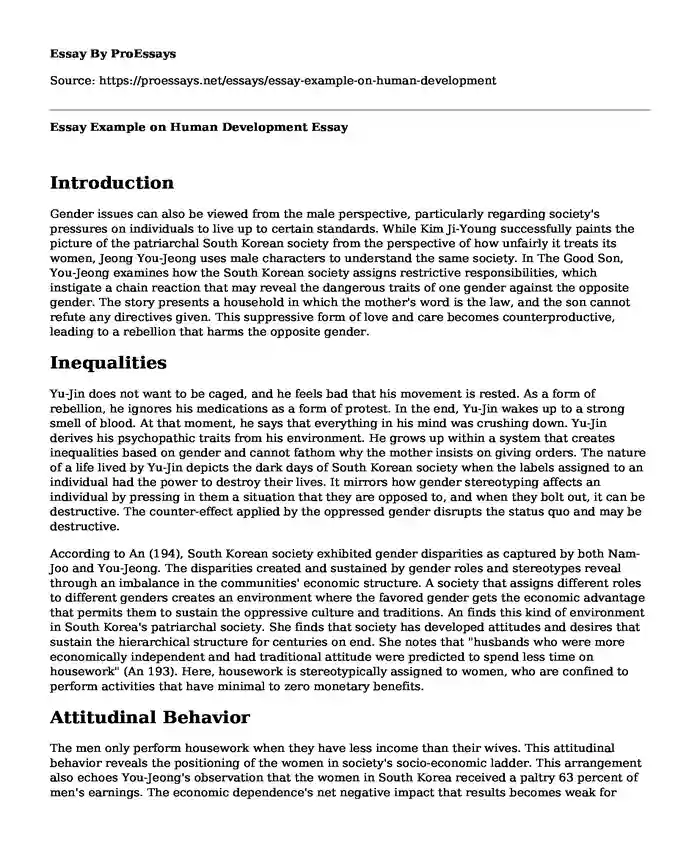Introduction
Gender issues can also be viewed from the male perspective, particularly regarding society's pressures on individuals to live up to certain standards. While Kim Ji-Young successfully paints the picture of the patriarchal South Korean society from the perspective of how unfairly it treats its women, Jeong You-Jeong uses male characters to understand the same society. In The Good Son, You-Jeong examines how the South Korean society assigns restrictive responsibilities, which instigate a chain reaction that may reveal the dangerous traits of one gender against the opposite gender. The story presents a household in which the mother's word is the law, and the son cannot refute any directives given. This suppressive form of love and care becomes counterproductive, leading to a rebellion that harms the opposite gender.
Inequalities
Yu-Jin does not want to be caged, and he feels bad that his movement is rested. As a form of rebellion, he ignores his medications as a form of protest. In the end, Yu-Jin wakes up to a strong smell of blood. At that moment, he says that everything in his mind was crushing down. Yu-Jin derives his psychopathic traits from his environment. He grows up within a system that creates inequalities based on gender and cannot fathom why the mother insists on giving orders. The nature of a life lived by Yu-Jin depicts the dark days of South Korean society when the labels assigned to an individual had the power to destroy their lives. It mirrors how gender stereotyping affects an individual by pressing in them a situation that they are opposed to, and when they bolt out, it can be destructive. The counter-effect applied by the oppressed gender disrupts the status quo and may be destructive.
According to An (194), South Korean society exhibited gender disparities as captured by both Nam-Joo and You-Jeong. The disparities created and sustained by gender roles and stereotypes reveal through an imbalance in the communities' economic structure. A society that assigns different roles to different genders creates an environment where the favored gender gets the economic advantage that permits them to sustain the oppressive culture and traditions. An finds this kind of environment in South Korea's patriarchal society. She finds that society has developed attitudes and desires that sustain the hierarchical structure for centuries on end. She notes that "husbands who were more economically independent and had traditional attitude were predicted to spend less time on housework" (An 193). Here, housework is stereotypically assigned to women, who are confined to perform activities that have minimal to zero monetary benefits.
Attitudinal Behavior
The men only perform housework when they have less income than their wives. This attitudinal behavior reveals the positioning of the women in society's socio-economic ladder. This arrangement also echoes You-Jeong's observation that the women in South Korea received a paltry 63 percent of men's earnings. The economic dependence's net negative impact that results becomes weak for traditionally-minded husbands who earned less than their wives. The enabling factor in such a society is the disenfranchisement of one gender so that it remains subservient to another. Men find it difficult to accept their women's reality earning more than them in the new countries because they perceive the issue from their traditionally biased lenses. This reality tortures them as they feel like lesser men. This feeling draws from the pressure that society places on men to dominate women.
Conclusion
Nam-Joo provides a platform for South Korean women to vent their long-buried trauma and pain. It is a feminist platform that challenges the rigid beauty ideals, which, among other things, gives a voice for women to express themselves on issues around sexual violence and gender parity. It is done to understand that the social atmosphere in the country does not permit women to realize the seriousness of crimes against them and think more critically and seriously about the crimes. Unlike in America, where race serves as the most emotive social and political issue, South Korea is about 98 percent Korean.
Cite this page
Essay Example on Human Development. (2024, Jan 11). Retrieved from https://proessays.net/essays/essay-example-on-human-development
If you are the original author of this essay and no longer wish to have it published on the ProEssays website, please click below to request its removal:
- Family Separation at the Border Case Study With Letter Example
- Freidenberg's Research on the Social Class of the Immigrant Narrators
- Homelessness in New York City Paper Example
- Essay Example on Developing My Mind Through Different Languages
- Violence in Our Societies: Growing Knowledge, Broader Ideas - Essay Sample
- Essay on Dorothy Dandridge: Pioneering Black Actress, Singer, Dancer in Face of Racism
- Essay on Digital Museum: Enhancing Experience Through Personalization & Interaction







